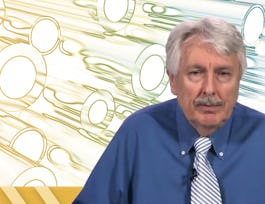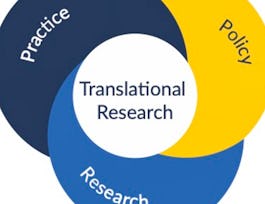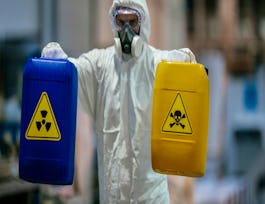This course is designed to cover subjects in advanced high school chemistry courses, correlating to the standard topics as established by the American Chemical Society. This course is a precursor to the Advanced Chemistry Coursera course. Areas that are covered include atomic structure, periodic trends, compounds, reactions and stoichiometry, bonding, and thermochemistry.



(2,308 reviews)
Details to know
7 quizzes, 1 assignment
See how employees at top companies are mastering in-demand skills

There are 7 modules in this course
We will learn about the components inside the atom and look especially at the electrons. The electron structure determines the properties of the elements. So, by the end of this series of lessons, you will know for each elements where the electrons are located in the atom.
What's included
17 videos1 reading1 quiz
Once we understand the electronic structure, we will be able determine how the periodic table can be used to compare the elements according to atomic size and various energies. We will conclude by seeing how these trends can be used to predict chemical properties of the elements.
What's included
10 videos1 reading1 quiz
Now that we know the structure of an atom, we can explore how atoms combine to form either molecular or ionic compounds. Then we will learn the rules of nomenclature that ensure that a compound is named according to IUPAC rules. We will end this unit by looking at quantitative relationships for compounds including the molar mass of and mass percent of an element in a compound.
What's included
30 videos1 reading1 quiz
We will explore how compounds react with one another to form new substances and then write balanced chemical equations to represent what is happening in a reaction. We will explore several different types of reactions including precipitation, acid-base, oxidation-reduction, and combustion reaction.
What's included
14 videos1 reading1 quiz
This unit will delve into the quantitative relationships we can determine from a balanced chemical equation to determine the relative amounts of substances needed to react or the amount of products formed. We will also explore limiting reagents and percent yield to address practical aspects of chemical reactions because there may be leftover reactants and/or incomplete formation of products.
What's included
23 videos1 reading1 assignment
This unit looks more in depth at molecular compounds to see how they are bonded together by looking at Lewis structures. These structures provide information about the types of bonds (single, double, or triple) as well as the connectivity of atoms. By knowing the Lewis structure, we can also predict the three-dimensional geometry of an individual molecule.
What's included
23 videos1 reading1 quiz
In this unit, we will learn about thermochemistry, which is the study of the thermal energy transfer (heat) in chemical reactions. We will learn how these measurements of heat are made via calorimetry. Then, learn to calculate heat transfer using various methods.
What's included
15 videos1 reading2 quizzes
Instructors


Offered by
Recommended if you're interested in Chemistry

Georgia Institute of Technology

The Hong Kong University of Science and Technology

University of Michigan

University of California, Davis
Why people choose Coursera for their career




Learner reviews
2,308 reviews
- 5 stars
79.91%
- 4 stars
15.67%
- 3 stars
2.12%
- 2 stars
0.73%
- 1 star
1.55%
Showing 3 of 2308
Reviewed on Aug 30, 2020
Thank you very much for the great opportunity that you gave me to join you in this wonderful program
Reviewed on Mar 16, 2017
This course was intriguing and eye opening for me. It was relevant and broadly useful.
Reviewed on Jan 5, 2021
I love the resources (slides, questions). I found thermochemistry the most challenging- a recommended textbook or additional resources would be helpful in this section.

Open new doors with Coursera Plus
Unlimited access to 10,000+ world-class courses, hands-on projects, and job-ready certificate programs - all included in your subscription
Advance your career with an online degree
Earn a degree from world-class universities - 100% online
Join over 3,400 global companies that choose Coursera for Business
Upskill your employees to excel in the digital economy
Frequently asked questions
Access to lectures and assignments depends on your type of enrollment. If you take a course in audit mode, you will be able to see most course materials for free. To access graded assignments and to earn a Certificate, you will need to purchase the Certificate experience, during or after your audit. If you don't see the audit option:
The course may not offer an audit option. You can try a Free Trial instead, or apply for Financial Aid.
The course may offer 'Full Course, No Certificate' instead. This option lets you see all course materials, submit required assessments, and get a final grade. This also means that you will not be able to purchase a Certificate experience.

